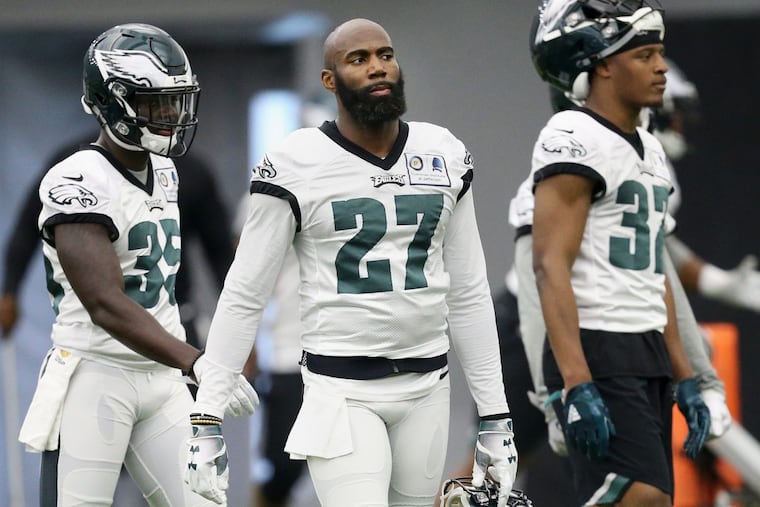Malcolm Jenkins had stopped protesting during anthem, but NFL's new policy is making him reconsider
It is unclear how many Eagles will visit the White House on June 5.

Talking to Malcolm Jenkins on Tuesday, it was clear the NFL's new national anthem policy has reopened the subject for players who had ended their on-field protests, believing they had made progress in getting the owners' backing on social justice initiatives.
"I haven't made a decision on that," Jenkins said after the Eagles' OTA work.
Owners moved last week to prohibit on-field protests, suggesting that players who felt the need to protest during the national anthem could stay in the locker room during the ceremony. The league made it clear it considers such protests disrespectful, a characterization the protesters have resisted.
>>READ MORE: While owners try to end on-field protests, the controversy surrounding them lives on
"I think everybody's processing what that [policy] means, what does it look like. I think individual teams want to do things that keep us united as a team," said Jenkins, who was a leader of the players' coalition that bargained for league backing of about $90 million toward projects for the underprivileged in exchange for dropping their protests.
"But I know guys have individual convictions. And, quite frankly, guys in our league don't like being told what to do, what they can and can't do," Jenkins said. "We don't have this type of policies for the other causes we support, whether it be our 'Salute to Service,' or breast cancer awareness, or anything else. It's just when you start talking about black folks, quite frankly. It's disheartening, but we'll continue to be creative.
"Guys get upset when you try to tell them what they can and can't do. The same way the entire league got sparked last year when [President] Trump made his comments," suggesting an owner should order someone to "get that son-of-a-bitch off the field" when a player protested, and that the player should be "fired."
That weekend, protests swept the league. "We went from, like, nine guys [protesting] to over 200," Jenkins said.
"I hope that the focus, even for guys who decide to get involved, isn't about our rights as players to protest. That's not what we're here fighting for. We're fighting for communities. If your only motivation to do anything or get involved or speak up is for your right as a player to protest, that's different. I think there are a ton of guys who have been committed to their communities, with their time, their money – people have put a lot of things on the line, sacrificing just to be able to better their communities, and that won't stop."
>>READ MORE: Jeffrey Lurie stays ambiguous on anthem policy vote
Last week's move was a nasty shock to players who thought progressive voices among the league's leadership might keep the owners from acting against a protest movement that seemed to be dwindling down, even as many players remained upset over the fact that quarterback Colin Kaepernick, the protest originator, doesn't have a job.
"I think 'disappointed' is probably the best way to describe it … . I've worked with the league and talked to the league about what we're doing," Jenkins said. "To have [commissioner] Roger Goodell come to Philly and show him first-hand what's going on in this community, and to do the same with [Eagles owner] Jeffrey Lurie, [Patriots owner] Robert Kraft, and [have] talks with [Falcons owner] Arthur Blank, [Dolphins owner Stephen] Ross down in Miami – all these different owners who have seen first-hand the type of work we've been doing, why players are so passionate about it, to then come back with a decision like that just lacks the empathy, sensitivity, and context that I think players were looking for."
Jenkins said he had not spoken with Lurie, an owner who had been considered an ally to players. Lurie released a statement after the announcement of the policy extolling the players' goals and their engagement in the community, without mentioning the anthem or the league's action. Under the new policy, teams are allowed to set their own protest punishments for individual players. Lurie did not address that subject, either.
>>READ MORE: The NFL says it supports protests, but instead it is making them invisible
It remains unclear how many Eagles will visit Trump's White House next week in celebration of their Super Bowl victory. Linebacker Nigel Bradham said he was asked for a decision at a team meeting Tuesday. Bradham said he hadn't decided, and that he was given until 5 p.m. Tuesday to make a choice about the June 5 trip.
"From guys who've gone before, the experience is amazing," regardless of the identity of the president, said Bradham, who said his understanding was that a championship team gets a much more extensive tour than the one available to tourists. "I'm definitely going to talk it over with my family."